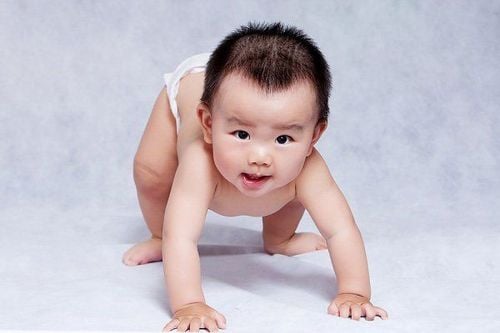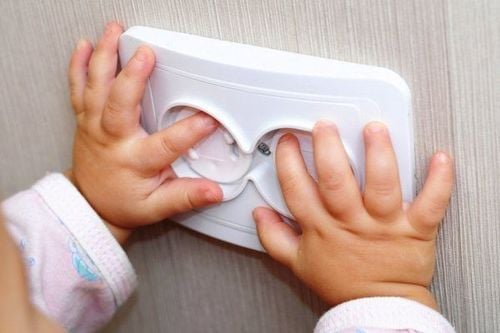This is an automatically translated article.
When starting to enter the 9-month-old stage, babies will become hyperactive and enjoy exploring the world around them more. At this time, children develop in all aspects, from motor, physical, language, emotional, and intellectual abilities. Children also become more flexible and begin to know how to regulate their own emotions. So what issues should mothers pay attention to during this stage of their child's development, read the following references and apply them to your baby's care more.
1. Development of a 9-month-old baby
What does a 9-month-old baby do? Children can crawl, crawl, learn to bend their knees, learn to sit, they can even learn to walk. This is the perfect time for parents to let their children play games that stimulate children's movement such as strollers, rocking horses, etc. Create your own by exposing your baby to toys with music, colorful pictures... Here are some of the physical and brain development that a 9-month-old baby can achieve.
1.1 Physically Children can stand up and sit down on their own. Babies may crawl or crawl on the floor, some babies may have a unique crawling pattern such as crawling on only one leg. Take the foods by hand and can eat. Pick up your own favorite toys or objects. Be able to wave, clap or hold two objects that hit each other. Use fingers to point to objects. Ability to play with simple puzzles or stack objects. 1.2 Language ability Can babble or imitate saying some simple words like mama, papa. Imitate the cough of an adult, use the tip of the tongue to make a cry. Can say some simple words but not exactly. For example, if a child disagrees with something, he may cry, say "no", and wave his hand. 1.3 About the brain Children can observe all kinds of colors well. Have a particular preference, and may or may not like to eat certain foods. Curious, like to explore things around, how things work. Being able to remember the location of some objects in the house, the child will be more persistent in finding (or even crying) when discovering objects suddenly disappear. Can express some emotions such as: joy, worry, sadness, separation... Children will show joy when they see their mother and relatives around. Children are also able to distinguish between strangers (for example, when grandparents visit or new nannies) and are wary and fearful around them – which is a sign of fear of strangers. When adults use their hands to greet and say goodbye, children can imitate them, and can use their hands to say hello and goodbye again.

Trẻ sơ sinh phát triển theo từng giai đoạn nhất định
2. Care regime for 9-month-old children
At the 9th month, the boy will have an average height of 72.7cm, weight about 9.3kg. Girls will have an average height of 71.3cm, an average weight of about 8.8 kg
At this age children will need about 750 calories to 900 calories per day. Half of that, about 400 to 500, should come from breast milk, which equates to about 720 ml of breast milk per day. 9 month old babies still love to breastfeed, so feed them when you can, or when they are scared, cry...
One of the changes when babies are 9 months old is the order in which you give them provide menus for children. In the past, mothers often gave their babies breast milk or formula before giving them solid foods, but when the baby is 9 months old, you can give them solid foods first and then feed them later.
By 9 months, most babies sleep through the night and two to three naps during the day, each lasting one to two hours at a time. Factors such as illness, teething, and growth spurts can cause temporary disturbances in sleep. Don't be discouraged if your child experiences some temporary sleep disturbance. In addition, mothers should be consistent in practicing the child's bedtime routine by:
Letting the child sleep separately, in a crib, bed or mattress. Stick to a daily bedtime so your child knows his or her bedtime. Do not let the baby fall asleep while the baby is suckling and not fully breastfed. Start bedtime with a comfortable mood: full meal, clean toilet, loose clothes, cool room temperature. Mother rub the baby's back or slap his bottom in rhythm, until the baby falls asleep.

Cha mẹ có thể đặt con ngủ trong cũi riêng và duy trì thói quen ngủ của trẻ
3. Health for 9-month-old babies
Please refer to the vaccination schedule to know what diseases 9 months old children need to be vaccinated against.
Mothers should check the baby's weight, length and head circumference regularly to monitor the baby's growth.
Discuss the baby's diet, growth, common problems at this stage such as sleeping patterns, weaning, teething, fear of strangers with pediatrician and counselor nutrition.
4. Safe for 9-month-old babies
9-month-old babies are curious, active, love to explore everything around, so build a “safe house” for your baby:
Install power cords, sockets, safety plugs All for children. There are doors, gates, sturdy fences, suitable heights for children's ages. Windows must have bars, solid vertical bars and a distance to ensure that children cannot get through. Medicines should be kept in the medicine cabinet and out of the reach of children. Knives, scissors and sharp objects used for cutting should be kept out of the reach of children. Pets in the house must be kept safe for children. Do not allow children to play with small toys or small objects that are easy to swallow. When babies enter the 9th month after birth, babies are very active and want to explore the world around them. Some children can even stand and take their first steps. Therefore, parents need to understand the developmental milestones as well as how to care for their children to have the best health.

Lắp đặt ổ cắm an toàn cho trẻ 9 tháng tuổi
When a child shows abnormal signs of health, parents can take the child to Vinmec Health system for timely examination and treatment.
As a key area of Vinmec Health System, Pediatrics Department - Vinmec International General Hospital always brings satisfaction to customers and is highly appreciated by industry experts thanks to the following advantages:
gathers a team of leading doctors and doctors in Pediatrics: including leading experts, with high professional qualifications (professors, associate professors, doctorates, masters), experienced, having worked in different hospitals. big hospitals like Bach Mai, 108.. The doctors are all well-trained, professional, have a heart - reach, understand young psychology. In addition to domestic pediatric specialists, the Department of Pediatrics also has the participation of foreign experts (Japan, Singapore, Australia, USA) who are always pioneers in applying the latest and most effective treatment regimens. . Comprehensive services: In the field of Pediatrics, Vinmec provides a series of continuous medical examination and treatment services from Newborn to Pediatric and Vaccine,... according to international standards to help parents take care of their baby's health from birth to childhood. from birth to adulthood Specialized techniques: Vinmec has successfully deployed many specialized techniques to make the treatment of difficult diseases in Pediatrics more effective: neurosurgery - skull surgery, stem cell transplantation. blood in cancer treatment. Professional care: In addition to understanding children's psychology, Vinmec also pays special attention to the children's play space, helping them to have fun and get used to the hospital's environment, cooperate in treatment, improve the efficiency of medical treatment. To register for examination and treatment with Pediatricians at Vinmec International General Hospitals nationwide, please click the "Contact" button on the website or register for an online examination.
Please dial HOTLINE for more information or register for an appointment HERE. Download MyVinmec app to make appointments faster and to manage your bookings easily.
Reference source: whattoexpect.com; Verywellfamily.comMORE:
9-month-old baby is afraid of solid foods, what to do? What can a 9-month-old baby do? What is a sign of a disease in a 9-month-old child who frequently vomits after coughing?













